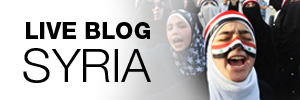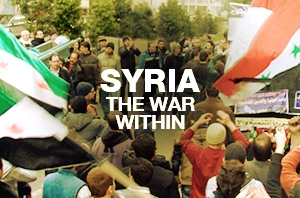Syria holds election snubbed by opposition
Voters cast their ballots in Damascus and other regions, while in opposition strongholds residents boycotted the polls.

Syrians have voted in the first multiparty parliamentary election in five decades against a backdrop of violence and dismissed as a sham by the opposition.
Most of the restive areas that have seen regular protests against the government of President Bashar al-Assad boycotted the elections on Monday.
According to independent observers in Damascus, election turnout was low.
Syrian state television showed people queuing in front of polling stations. Interior Minister Mohammad Ibrahim al-Shaar said that voting took place in a peaceful atmosphere “with voting centres witnessing considerable turnout.”
In a statement to journalists at the voting centre at the foreign ministry, Adel Safar, the prime minister, said the legislative elections “mark an important and historic stage in Syria, which is moving forward with the announced comprehensive reform programme despite all conspiracies to hinder the development process.”
 |
The election is not part of a comprehensive and inclusive political dialogue for a democratic future of the country, the United Nations said.
“These elections are not taking place within that framework,” said Martin Nesirky, spokesman for UN Secretary General Ban Ki-moon. “Moreover, a democratic process cannot be successful while violence is still ongoing.”
Al Jazeera’s Anita McNaught, reporting from Istanbul in neighbouring Turkey, said that Syrian groups had mixed feelings towards the polls.
“When large parts of the country are effectively under military occupation, when large parts of the country are at great physical odds with the central government, and there is in some parts of the country absolutely a rein of terror, how is it possible to move on with a consentual democratic process? That’s the argument on one side,” McNaught said.
|
“By taking part in the election, Syrians are defying the campaign of terrorism and aggression led by international and regional parties implicated in a terrorist war against our country” – Adnan Mahmoud, |
“The argument on the other side is that we are seeing the beginnings, however fragile however incomplete, of political pluralism in Syria. Of these eight parties [participating in the polls], there are seven parties more than the people contesting the last election. It has been a one party state for many decades now, and perhaps we are seeing a change in that?”
However, our correspondent added that a proposal in the new constitution mandated that half the representatives in the new parliament must be from workers groups, particularly peasants or countryside workers.
“And critics of that proposal argue that the unions that represent [these workers] are controlled by the Baath party; so all roads lead back to the Baath party, whether formally or informally,” McNaught said.
A referendum in February to adopt a new constitution ended the ruling Baath party’s solo run for five decades.
Nine parties have been created, and eight have candidates vying for a parliamentary seat.
Pro-government parties led by the Baath are represented under a coalition called the National Progressive Front.
 |
| Click here for more of Al Jazeera’s special coverage |
A total of 7,195 candidates have registered to stand for the 250 seats, state news agency SANA said.
Political specialists, however, believe the elections will not make any significant political changes in Syria, where a tenuous UN-backed ceasefire that came into effect on April 12 has failed to take hold.
“The elections are a step in a void and will not lead to any change in the political landscape and security of Syria,” Oraib al-Rantawi, director of the Amman-based Al-Quds Centre for Political Studies, told the AFP news agency.
It is taking place “amid a lack of security, continued killings and violence … while [many] are detained, suffering or displaced,” Rantawi said, dismissing the elections as “media propaganda”.
But Adnan Mahmoud, Syria’s information minister, said that voting was an act of defiance.
“By taking part in the election, Syrians are defying the campaign of terrorism and aggression led by international and regional parties implicated in a terrorist war against our country,” he said in a statement.
Syrian authorities have repeatedly blamed the violence on “armed terrorist groups” and outside parties.
The Syrian opposition has dismissed the vote as a sham. Bashar al-Haraki, a member of the Syrian National Council (SNC), the principal opposition coalition, has labelled the elections a “farce which can be added to the regime’s masquerade”.
However, local activists frustrated with the SNC, have formed the Transitional Syrian Parliament, a body which they say will lead the fight to bring down the Assad government.
Basam Emadi, the former Syrian ambassador to Sweden, told Al Jazeera: “The idea of a transitional parliament is looked on with a great deal of suspicion by members of the SNC which has been widely recognised as a government in exile”.
The vote also comes as UN observers are deployed in Syria to monitor a tenuous ceasefire and as deadly violence continues to rock the country.